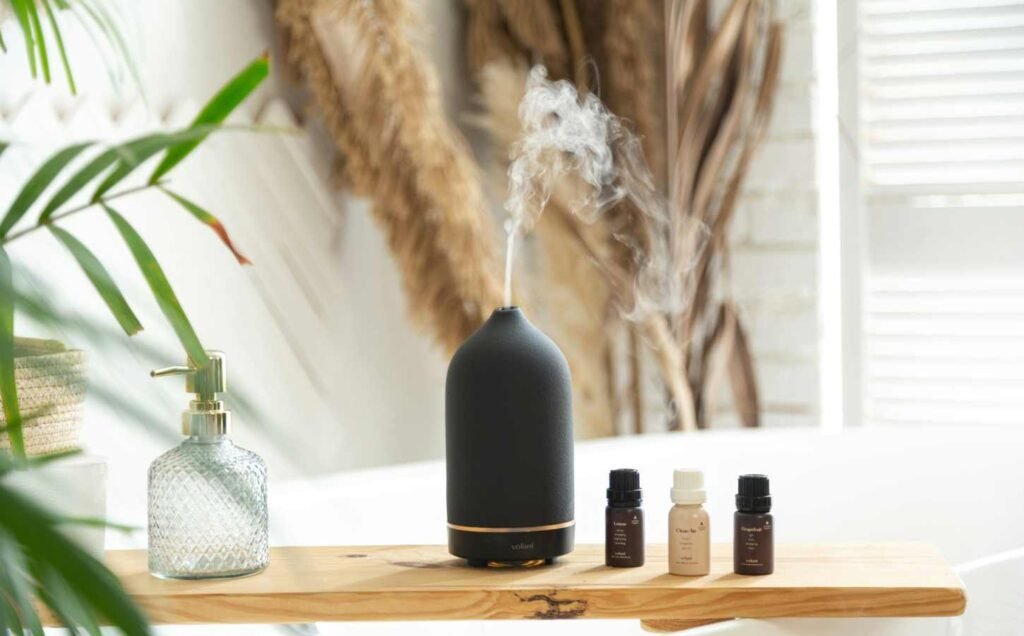Key Highlights
- Improving sleep quality and hygiene is essential for overall well-being and mental health.
- Natural sleep aids can help regulate the sleep cycle and promote better sleep.
- Establishing a soothing pre-sleep routine can signal the body that it’s time to rest.
- Creating an ideal sleep environment can enhance sleep quality by promoting relaxation.
- Limiting screen time before bed can improve sleep by reducing exposure to blue light.
- Embracing power of aromatherapy with essential oils like lavender can promote better sleep.
Introduction
Sleep plays a crucial role in our overall health and well-being. A good night’s sleep is essential for physical and mental rejuvenation, but many struggle with sleep-related issues like insomnia or poor sleep quality. While there are various factors that can affect sleep, including stress, lifestyle habits, and medical conditions, there are also several natural ways to improve sleep.
In this article, we will explore effective tips to sleep naturally improve sleep and optimize your sleep routine. From establishing a soothing pre-sleep routine to creating an ideal sleep environment, we will explore various forms of sleep aids that can promote better sleep. We will also discuss the science of sleep, the impact of lifestyle adjustments, and the role of diet in enhancing sleep quality.
Additionally, we will explore the use of natural supplements and herbs for sleep and the influence of technology on sleep patterns. By implementing these tips and making simple changes, you can improve your sleep and wake up feeling refreshed and rejuvenated.
Effective Tips to Naturally Improve Your Sleep
When it comes to improving sleep, establishing good sleep habits and a consistent sleep routine is key. This includes going to bed and waking up at the same time every day, even on weekends. Consistency helps regulate your body’s internal clock and promotes better sleep quality. Practicing good sleep hygiene is also important, especially for older people. This involves creating a sleep-friendly environment that is cool, dark, and quiet. Avoiding stimulating activities and caffeine close to bedtime, along with incorporating relaxation techniques, can further enhance your sleep routine and promote better sleep.
1. Establishing a Soothing Pre-Sleep Routine
Creating a soothing pre-sleep routine can signal to your body that it’s time to unwind and prepare for sleep. This routine can include activities that promote relaxation, such as taking a warm bath, reading a book, or practicing deep breathing exercises.
Avoid engaging in stimulating activities or using electronic devices before bed, as the blue light emitted from screens can interfere with your sleep cycle. Instead, opt for calming activities that help you relax both mentally and physically, such as using lavender essential oil to slow your heart rate and promote deep sleep.
By establishing a soothing pre-sleep routine, you can create a peaceful transition from wakefulness to sleep, allowing your body and mind to enter a state of relaxation conducive to restful sleep naturally.
2. Creating an Ideal Sleep Environment
Creating an ideal sleep environment is crucial for promoting better sleep quality. Start by ensuring that your bedroom is cool, quiet, and dark. Consider using blackout curtains or an eye mask to block out any excess light that may interfere with your sleep.
Maintain a comfortable room temperature that is neither too hot nor too cold, as extreme temperatures can disrupt sleep. Additionally, invest in a comfortable mattress and pillows that provide adequate support for your body.
By optimizing your sleep environment, you can create a peaceful and relaxing space that promotes better sleep and enhances the overall quality of your rest.
3. Limiting Screen Time Before Bed
One of the major culprits for poor sleep quality in today’s digital age is excessive screen time before bed. The blue light emitted by electronic devices like smartphones, tablets, and computers can interfere with the body’s natural sleep-wake cycle. This light suppresses the production of melatonin, a hormone that regulates sleep.
To improve sleep, it is important to limit screen time at least an hour before bed. Instead, engage in relaxing activities like reading a book or practicing mindfulness meditation.
If you find it challenging to reduce screen time, consider using blue light filters or downloading apps that adjust the screen’s color temperature to minimize the impact on your sleep cycle.
Cognitive-behavioral therapy techniques can also be helpful in changing screen-related habits and improving sleep hygiene.

Essential Oil Diffusers like the one pictured above are available on Amazon.com in many different styles and colors.
As an Amazon.com Affiliate, we may earn a small commission if you buy from a link within this page.
4. Embracing the Power of Aromatherapy
Aromatherapy can be a powerful tool for promoting better sleep. The use of essential oils has been shown to have a positive impact on sleep quality and relaxation. Here are some essential oils commonly used for sleep:
- Lavender: Known for its calming properties, lavender oil can promote relaxation and improve sleep quality.
- Chamomile: Chamomile oil has soothing properties and can help reduce anxiety and promote restful sleep.
- Bergamot: Bergamot oil has mood-enhancing and stress-reducing effects, making it beneficial for improving sleep.
- Sandalwood: Sandalwood oil can induce a sense of relaxation and is often used in meditation practices.
Incorporating these essential oils into your bedtime routine through diffusers, pillow sprays, or aromatherapy massages can create a calming atmosphere that promotes better sleep.
5. Incorporating Gentle Yoga or Stretching
Incorporating gentle yoga or stretching exercises into your daily routine can have a positive impact on both sleep and overall well-being. Regular physical activity, including gentle yoga poses or stretching, has been shown to improve sleep quality and duration.
These activities help release tension in the body, reduce stress, and promote relaxation. Engaging in a gentle yoga or stretching routine before bed can also help calm the mind and prepare the body for sleep.
Focus on slow, deep breathing and gentle movements to encourage a sense of tranquility and promote better sleep. Remember to listen to your body and only engage in activities that feel comfortable and safe for you.
Additionally, taking glycine supplements before bedtime has been shown to improve sleep quality and help individuals fall asleep faster.
6. Optimizing Your Diet for Better Sleep
Diet plays a significant role in sleep quality. Optimizing your diet by incorporating sleep-friendly foods and avoiding certain substances can improve your sleep. Here are some tips to consider:
- Avoid consuming large meals or heavy snacks close to bedtime, as digestion can interfere with sleep.
- Limit your intake of caffeine, especially in the afternoon and evening, as it can disrupt sleep.
- Incorporate sleep-friendly foods into your diet, such as whole grains, fruits and vegetables, lean proteins, and foods rich in magnesium.
- Consider taking magnesium supplements, as magnesium deficiency has been linked to poor sleep quality.
- By adopting a balanced and nutritious diet, you can support your overall health and promote better sleep.
7. The Importance of a Regular Sleep Schedule
Maintaining a regular sleep schedule is crucial for optimizing sleep quality. Our bodies have an internal clock, known as the circadian rhythm, which regulates sleep-wake cycles.
Going to bed and waking up at consistent times each day helps align our sleep patterns with this natural rhythm. By establishing a regular sleep routine, you signal to your body when it’s time to sleep, making it easier to fall asleep and wake up feeling refreshed.
Consistency in your sleep schedule also helps regulate hormonal and metabolic processes, supporting overall health. Aim for a bedtime that allows for enough quality sleep of 7-9 hours and stick to this schedule even on weekends.
By prioritizing a regular sleep schedule, you can optimize your sleep and reap the benefits of better sleep quality.
8. Mindfulness and Meditation Techniques
Practicing mindfulness and meditation techniques can be effective strategies for improving sleep. Mindfulness, the practice of paying attention to the present moment without judgment, can help reduce stress and promote relaxation.
By focusing on your breath, sensations, or thoughts, you can quiet the mind and calm the body, making it easier to transition into sleep. Meditation techniques, such as guided imagery or progressive muscle relaxation, can also be beneficial for promoting sleep.
These techniques help reduce sleep latency, the amount of time it takes to fall asleep, by promoting a state of relaxation and reducing anxiety. Incorporating mindfulness and meditation practices into your bedtime routine can enhance your sleep quality and improve overall mental well-being.
9. Reducing Caffeine and Alcohol Intake
Caffeine and alcohol are known to disrupt sleep patterns and quality. Caffeine is a stimulant that can interfere with the sleep cycle, making it harder to fall asleep and stay asleep.
It is advisable to limit caffeine intake, especially in the afternoon and evening, to reduce daytime sleepiness. Alcohol, on the other hand, may initially make you feel drowsy, but it can disrupt the later stages of sleep and lead to fragmented sleep patterns.
It is recommended to avoid consuming alcohol close to bedtime. By reducing caffeine and alcohol intake, you can improve the overall quality of your sleep and wake up feeling more refreshed and energized. Opt for herbal teas or non-caffeinated beverages in the evening to promote better sleep and support your overall health.
10. Considering Natural Supplements
Natural supplements can also be considered for improving sleep quality. Here are some commonly used supplements and their potential benefits:
- Melatonin: A hormone that regulates sleep-wake cycles, melatonin supplements can help regulate sleep patterns and improve sleep quality.
- Valerian Root: Known for its sedative properties, valerian root can promote relaxation and reduce sleep latency.
- Magnesium: Magnesium supplements may improve sleep quality, especially in individuals with magnesium deficiency.
It is important to note that natural supplements may have side effects or interact with certain medications. It is advisable to consult with a healthcare professional before starting any new supplements, especially if you have any underlying medical conditions or are taking other medications.
Here is a text table summarizing the potential benefits and possible side effects of these natural supplements:
| Natural Supplement | Potential Benefits | Possible Side Effects |
| Melatonin | Regulates sleep-wake cycles, improves sleep quality | Daytime drowsiness, headaches, nausea |
| Valerian Root | Promotes relaxation, reduces sleep latency | Headaches, upset stomach, dizziness |
| Magnesium | Improves sleep quality, regulates sleep patterns | Diarrhea, stomach cramps, nausea |
Understanding the Science of Sleep
To further enhance our understanding of sleep, it is important to explore the science behind it. Sleep is a complex process that involves different stages and cycles. The sleep cycle consists of multiple stages, including rapid eye movement (REM) sleep and non-rapid eye movement (NREM) sleep.
During REM sleep, dreaming occurs, and brain activity increases. NREM sleep is characterized by slower brain waves and deeper sleep. Sleep disorders such as sleep apnea and restless legs syndrome can disrupt the sleep cycle and impact overall sleep quality.
Sleep medicine focuses on diagnosing and treating sleep disorders, including restless legs syndrome, to improve sleep health and well-being.
The Sleep Cycle Explained
The sleep cycle consists of several stages that repeat throughout the night. These stages include both rapid eye movement (REM) sleep and non-rapid eye movement (NREM) sleep. Here’s a breakdown of the sleep cycle and its stages:
- Stage 1: This is the transition stage between wakefulness and sleep. It is a light sleep stage and can last for a few minutes.
- Stage 2: In this stage, sleep becomes deeper, and brain waves slow down. It is the most prominent stage during the sleep cycle.
- Stage 3: Also known as slow-wave sleep or deep sleep, this stage is characterized by the slowest brain waves. It is essential for physical restoration and deep rest.
- REM Sleep: REM sleep is where dreaming occurs, and brain activity increases. It plays a crucial role in cognitive function and emotional well-being.
The sleep cycle typically repeats multiple times throughout the night, with REM sleep increasing in duration with each cycle. Understanding the sleep cycle can help identify any disruptions and promote better sleep hygiene.
How Light Affects Sleep
Light plays a significant role in regulating our sleep-wake cycles. Exposure to natural light during the day helps regulate the body’s internal clock, known as the circadian rhythm.
This rhythm is responsible for regulating sleep and wakefulness. However, exposure to artificial light, especially blue light emitted by electronic devices, can disrupt the production of melatonin, a hormone that promotes sleep.
Blue light suppresses melatonin production, making it harder to fall asleep and stay asleep. To optimize sleep, it is important to limit exposure to blue light in the evening, especially close to bedtime. This can be achieved by reducing screen time, using blue light filters on devices, and incorporating relaxing activities that promote sleep.
Lifestyle Adjustments for Enhanced Sleep Quality
In addition to the specific tips mentioned above, certain lifestyle adjustments can have a significant impact on sleep quality. Prioritizing physical health by engaging in regular exercise can promote better sleep.
Physical activity during the day can help regulate the sleep-wake cycle and reduce stress. Managing stress through relaxation techniques like meditation or deep breathing exercises can also improve sleep.
Establishing healthy sleep habits, such as avoiding daytime napping and practicing consistent sleep routines, can further enhance sleep quality.
By making these lifestyle adjustments, you can create a sleep-friendly environment and reduce the risk of complications such as high blood pressure, heart attack, and stroke.
The Role of Physical Activity
Regular physical activity has numerous health benefits, including improved sleep quality. Engaging in moderate-intensity aerobic exercise, such as brisk walking or cycling, can positively impact sleep patterns.
Exercise promotes the release of endorphins, which can reduce stress and anxiety, leading to better sleep. Additionally, physical activity can help regulate the sleep-wake cycle by increasing the body’s core temperature during exercise and promoting greater relaxation afterward.
It is important to note that exercising too close to bedtime may have the opposite effect and make it harder to fall asleep. Aim for at least 30 minutes of moderate-intensity exercise most days of the week to reap the sleep-enhancing benefits of physical activity, including regulating body temperature for a better night’s rest.
Managing Stress for Better Sleep
Stress is a common factor that can disrupt sleep patterns and quality. Managing stress effectively is crucial for promoting better sleep. There are various techniques and strategies that can help reduce stress and improve sleep. Engaging in relaxation techniques, such as deep breathing exercises, meditation, or mindfulness, can calm the mind and promote relaxation before bed.
Cognitive-behavioral therapy (CBT) is another effective approach for managing stress and improving sleep. CBT techniques, including identifying and challenging negative thought patterns and behaviors, can be helpful for those struggling with stress and sleep disturbances. By incorporating CBT into your daily routine, you can reduce stress levels and enhance your sleep quality.
The Impact of Diet on Sleep
Diet plays a significant role in overall health, including sleep quality. Certain foods and dietary habits can either promote or hinder sleep. Consuming a balanced diet that includes sleep-friendly nutrients, such as magnesium, can improve sleep quality.
In fact, one review found that magnesium supplementation could help reduce the amount of time it takes to fall asleep in older adults. Foods rich in magnesium, such as leafy greens, nuts, and seeds, can promote relaxation and support better sleep.
On the other hand, consuming heavy, spicy, or acidic foods close to bedtime can cause discomfort and exacerbate conditions like acid reflux, leading to disrupted sleep.
Making conscious choices about your diet and avoiding heavy meals close to bedtime can contribute to better sleep health.
Foods That Promote Sleep
Certain foods contain sleep-promoting compounds that can enhance sleep quality. Here are some examples of sleep-friendly foods:
- Turkey: Turkey is rich in an amino acid called tryptophan, which helps produce serotonin and melatonin, promoting relaxation and better sleep.
- Cherries: Tart cherries are a natural source of melatonin, making them an excellent choice for promoting sleep. Drinking tart cherry juice or consuming whole cherries can enhance sleep quality.
- Kiwi: Kiwi is another fruit that has been shown to improve sleep onset, duration, and efficiency. It is believed that the antioxidants and serotonin content in kiwi contribute to its sleep-promoting properties.
Incorporating these sleep-friendly foods into your diet can positively impact sleep quality and promote better overall health.
Foods to Avoid Before Bedtime
Certain foods and beverages can disrupt sleep and should be avoided before bedtime. Here are some examples:
- Caffeine: Avoid consuming caffeine, found in coffee, tea, chocolate, and some sodas, close to bedtime. Caffeine is a stimulant that can interfere with sleep quality and make it harder to fall asleep.
- Alcohol: While alcohol may initially make you feel drowsy, it can disrupt the later stages of sleep and lead to fragmented sleep patterns. It is best to avoid alcohol close to bedtime to ensure uninterrupted sleep.
- Acidic and Spicy Foods: Foods that are high in acidity or spiciness, such as citrus fruits, tomatoes, and hot peppers, can cause acid reflux or heartburn, which can interfere with sleep. It is advisable to avoid these foods close to bedtime to promote better sleep.
Natural Supplements and Herbs for Sleep
Natural supplements and herbs have been used for centuries to promote better sleep. Here are some commonly used natural sleep aids:
- Chamomile: Chamomile tea has soothing properties and can promote relaxation and better sleep.
- Valerian Root: Valerian root is a natural sedative that can improve sleep quality and reduce sleep latency.
- Lavender: Lavender aromatherapy or lavender-infused products can promote relaxation and improve sleep quality.
These natural sleep aids can be incorporated into your bedtime routine to enhance sleep and promote a sense of tranquility.
Melatonin and Its Benefits
Melatonin is a hormone that regulates the sleep-wake cycle. It is naturally produced by the body in response to darkness and helps promote sleep. Melatonin supplements are commonly used to regulate sleep patterns and improve sleep quality, making it a useful tool for those experiencing sleep issues.
They are especially effective for reducing sleep latency, the time it takes to fall asleep. Melatonin supplements can also be beneficial for individuals experiencing jet lag or those with irregular sleep schedules.
It is important to follow the recommended dosage and consult with a healthcare professional before starting any new supplements, especially if you have underlying health conditions or are taking other medications.
Valerian Root: A Natural Sedative
Valerian root is a natural sedative that has been used for centuries to promote relaxation and improve sleep quality. It works by increasing levels of a neurotransmitter called gamma-aminobutyric acid (GABA), which helps calm the body and mind.
Valerian root can reduce sleep latency and improve sleep quality, making it an effective natural sleep aid. While generally considered safe, some individuals may experience side effects such as headaches, upset stomach, or dizziness.
It is advisable to consult with a healthcare professional before using valerian root, especially if you have any underlying health conditions or are taking other medications for short periods.
Technology and Sleep
Technology plays a significant role in our daily lives, but it can also impact our sleep. The use of electronic devices, such as smartphones, tablets, and computers, before bed can disrupt sleep patterns due to the blue light they emit. Blue light suppresses the production of melatonin, making it harder to fall asleep and stay asleep.
However, technology can also be utilized to improve sleep through the use of sleep apps and sleep-tracking devices. These tools can provide insights into sleep patterns and help identify areas for improvement.
By understanding the impact of technology on sleep and using it mindfully, we can harness its benefits while minimizing its negative effects.
Apps and Gadgets That Improve Sleep
With the advancement of technology, there are various apps and gadgets available to improve sleep quality. Here are some examples:
- Sleep-tracking apps: These apps monitor your sleep patterns and provide insights into the duration and quality of your sleep. They can help identify factors that may be affecting your sleep and suggest strategies for improvement.
- White noise machines: These devices produce soothing sounds, such as rainfall or ocean waves, to mask background noises and promote relaxation for better sleep.
- Wake-up light alarm clocks: Instead of abrupt and jarring alarm sounds, wake-up light alarm clocks simulate a natural sunrise, gradually increasing light intensity to wake you up gently and more naturally.
These apps and gadgets can be valuable tools for enhancing sleep quality and promoting a more restful night’s sleep.
The Problem with Blue Light
Blue light emitted by electronic devices can disrupt our sleep-wake cycle and melatonin production. Blue light is particularly problematic before bedtime as it inhibits the release of melatonin, a hormone that regulates sleep. Exposure to blue light in the evening can make it harder to fall asleep and negatively impact sleep quality.
To minimize the effects of blue light on sleep, it is advisable to limit screen time and use blue light filters or special glasses that block blue light. Additionally, adopting a consistent bedtime routine that does not involve electronic devices can promote better sleep hygiene and improve overall sleep quality.
Conclusion: Sleep Naturally
Improving your sleep naturally is achievable with these practical tips. Establishing a soothing pre-sleep routine, creating an ideal sleep environment, and embracing mindfulness techniques can significantly enhance your sleep quality. Understanding the science behind sleep cycles and the impact of light on sleep patterns is crucial.
Lifestyle adjustments like regular physical activity and stress management also play a vital role. Pay attention to your diet, incorporating sleep-promoting foods and avoiding stimulants before bedtime. Consider natural supplements like melatonin and valerian root for additional support in achieving restful sleep.
By making small lifestyle changes and prioritizing your sleep hygiene, you can experience a significant improvement in your overall well-being.
Frequently Asked Questions
What natural remedies are most effective for insomnia?
Natural remedies that have shown effectiveness in improving sleep quality include valerian root, chamomile tea, melatonin supplements, and cognitive-behavioral therapy (CBT). These natural sleep aids can promote relaxation, reduce sleep latency, and regulate sleep patterns.
Can changing my diet really improve my sleep quality?
Yes, changing your diet can have a positive impact on sleep quality. Incorporating sleep-friendly foods, such as those rich in magnesium and those with natural sleep-promoting compounds like tart cherry juice, can support better sleep and overall health.
How does exercise affect sleep?
Regular physical activity, including exercise, has been shown to improve sleep quality. Engaging in physical activity helps regulate the sleep-wake cycle, reduces stress, and promotes relaxation, ultimately leading to better sleep hygiene.
Are there any risks associated with using natural sleep aids?
While natural sleep aids are generally considered safe, they may have potential side effects or interact with certain medications. It is important to consult with a healthcare professional before starting any new supplements, especially if you have underlying health conditions or are taking other medications.
What lifestyle changes can I make today to start sleeping better tonight?
To start sleeping better tonight, you can make several lifestyle changes. Establish a consistent sleep routine, practice stress management techniques, prioritize sleep hygiene, engage in regular physical activity, and prioritize mental health to promote better sleep.
Understanding Insomnia: Symptoms, Causes, and First Steps Towards Better Sleep

Insomnia can be a challenging condition, but understanding insomnia, its causes, and its symptoms is the first step towards overcoming it. By adopting healthier sleep habits and making changes to your lifestyle, you can start on the path to better sleep.
Continue reading: Understanding Insomnia
Improve Sleep Duration and Quality with Progressive Muscle Relaxation for Sleep

Using progressive muscle relaxation for sleep, is a simple yet powerful technique that can significantly enhance the duration and quality of sleep. By systematically tensing and relaxing your muscles, you can reduce physical and mental stress, making it easier to drift off into a restful sleep.
Incorporate progressive muscle relaxation into your nightly routine and combine it with good sleep hygiene practices to enjoy the full benefits of a rejuvenating night’s sleep.
Continue reading: Progressive Muscle Relaxation for Sleep





